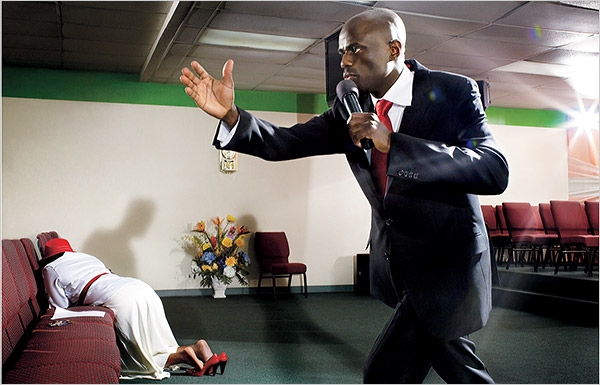| Seth Barnes | The Holy Spirit is on the move | 8 Comments on Africa – the new face of Christianity
Africa – the new face of Christianity

As we Americans follow the Europeans and enter a post-Christian era, the nations we once evangelized are stepping into the breach. Andrew Rice describes an amazing trend in his article “Mission from Africa” in the New York Times.
The West is being supplanted as a missionary force b…
By Seth Barnes
As we Americans follow the Europeans and enter a post-Christian era, the nations we once evangelized are stepping into the breach. Andrew Rice describes an amazing trend in his article “Mission from Africa” in the New York Times.
The West is being supplanted as a missionary force by, of all places, Africa. The number of Christians in Africa grew from 10 million to 360 million
in the past century, and that number is on course to double in the next two decades. Many African churches are now beginning to send missionaries to us here in America.
in the past century, and that number is on course to double in the next two decades. Many African churches are now beginning to send missionaries to us here in America.

Rice begins the article by talking about revival:
Revival is an eternal theme in the history of Christianity. Time after
time, evangelical fervor ignites, burns itself out and then re-emerges
in some altered and surprising form, in constant cycles of migration
and renewal.The ferment of the Reformation and the Counter-Reformation
sent Puritans to New England, Quakers to Pennsylvania
and Jesuits into the wilds of South America. The missionary movements
of the 19th century inspired pious adventurers to travel to Africa and
spread, in the famous formulation of David Livingstone, “Civilization,
commerce and Christianity.”Today the process is reversing itself, as
the population of churchgoers dwindles in Europe, remains fairly static
in the United States and erupts in the “global south” – a geopolitical
term that encompasses Africa, Latin America and much of Asia. Seven
years ago, in a book titled “The Next Christendom,” Philip Jenkins, a Penn State
religious scholar, predicted that the global south would eventually
come to represent Christianity’s center of gravity. Now it appears that
phenomenon is starting to manifest across a broad spectrum of Christian
belief, challenging patterns of leadership and notions of religious
identity that in some cases have stood for centuries.
I’ve been fortunate to travel somewhat regularly to Africa and to partner with believers there in ministry. I’m continually challenged by the seriousness with which they treat not only spiritual issues like healing and demonic possession, but also fundamental issues such as the authority of Scripture in a Christian’s life. If, like Esau, we Westerners are trading our inheritance, then African Christians may be the ones who are the inheritors.
As Philip Jenkins notes in The New Faces of Christianity, the northern hemisphere may need to look to the South for a renewed religious conservativism if we are to remain faithful to the Bible. The sad truth, according to Jenkins, is that many North American and European churches are “willing to accommodate liberalizing trends in the wider society, while their African and Asian counterparts prove much more conservative. These controversies are grounded in attitudes to authority and, above all, to the position of the Bible as an inspired text.”
For Africans, the Bible is relevant in the way it addresses the issues of poverty and debt, famine, racial oppression, and persecution. Their poverty promotes “the awareness of the transience of life, the dependence of individuals and nations on God, and the distrust of the secular order.”
Isn’t it just like the Lord to do this – to turn our world upside down, humbling those of us who have taken Jesus for granted while lifting up those who recognize him for who he is? I’m committed to joining my brothers and sisters who have taken the torch that the church elsewhere may be laying down, and encouraging them as they run with it. Are you with me?
*Photo courtesy of NYTimes.com



YES! This is great… 20 years ago, Africa’s faith was generally described as “a mile wide and an inch deep” but God has taken it deep through persecution, AIDS, suffering, disease, poverty, genocide and all kinds of other stuff about which we in the West have no concept! Pity that it may take the same kind of suffering to bring America to repentance -but what a joy to watch our brothers and sisters in the global south picking up the torch. Godspeed!
AMEN!!
Seth,
There is simply no way that I can let this go by without commenting. This writing confirms so much how the Lord is leading at this time. I always thought in my mind and heart that the Latin church would come to evangelize the U.S. at some point. Little did I recognize until the Lord showed me that even Christian Pastors and Christian ministers in Muslim dominated countries will be training some of us on how to share the Gospel in places where it is no longer welcomed, like our own country. Yesterday Pastor Nadeem who is a self supported Pastor from Pakistan wrote to me offering that at some point it may be necessary for pastors and ministers who have worked in persecuted countries to come to train some of us, or to do so through networking and sharing. He and others look forward to an opportunity to teach all of us how to minister in persecuted lands. This passage in Isaiah is very telling indeed:
Isaiah 26:9-11 (New International Version)
9 My soul yearns for you in the night;
in the morning my spirit longs for you.
When your judgments come upon the earth,
the people of the world learn righteousness.
10 Though grace is shown to the wicked,
they do not learn righteousness;
even in a land of uprightness they go on doing evil
and regard not the majesty of the LORD.
11 O LORD, your hand is lifted high,
but they do not see it.
Let them see your zeal for your people and be put to shame;
let the fire reserved for your enemies consume them.
Seth, I know your site is for “radical christians” but my next statement might be a little bit too radical for some.
When God allows persecution and trouble, real christians rise and church grows. It awakens the christians from their slumber of complacency.England is in the beginning of the throws of persecution as Muslim “rules” are growing stronger here.Im excited about this! It is not happening fast enough! When I went to church last year and they were talking about the new religious hatred bill that was trying to be passed in this country, that could lead christians into a 7 year prison sentance for preaching that Jesus was the only way, I think there was only about 4 of us in that meeting saying “Bring it on!”
Places like Africa have had devastating hard times, war, famine, HIV epidemics, and out of it has born beautiful fruit for our living God.Europe is going to be shaken to its core if its not careful, in very similar ways, things that cause serious devastation, so God can collect His reward.
Watching a TV programme not so long ago they were asking people in the streets here about God. There is a SERIOUS hardness of heart which came across loud and clear. Sending missionaries here from other countries right now would not work. God needs to break the hardness first…….and I certainly wouldnt like to be on the receiving end of that!
But bless the countries that are growing!
To Wayne’s point about persecuted countries, one of the three main things Brother Yun trains people to do is escape from arrest! He teaches them how to jump out of second-story windows and land properly so that they can run away. Blew my mind when I read that in his book. We can learn a lot from our brothers and sisters in those countries where the gospel is advancing admist great persecution. When I think about it, what a small price it is to pay (persecution, beatings, imprisonment, etc.) to have God’s presence and power at hand. The disciples in Acts were joyful that they had the privilege of suffering for His name. I’m working on getting to that place myself.
That is it Gabe! For persecution to thrive, in a place like America, real disciples have to take His kind of radical stand in the face of opposition. To relish the privilege of suffering lose in a nation that’s big on Rights and even make it prison for Jesus’ sake you simply have to die. Most rebels die anyway… before they are killed.
Great article. I have been so impressed by the faith of the east Africans that I have become friends with. It is good to be reminded that God is still bringing revival in many places.
The Lord continues to work in mighty ways as the gospel goes forth. While this is true in many parts of Africa, it is also true among many of the African immigrants and refugees that have recently come to the US. Sudanese Church MN